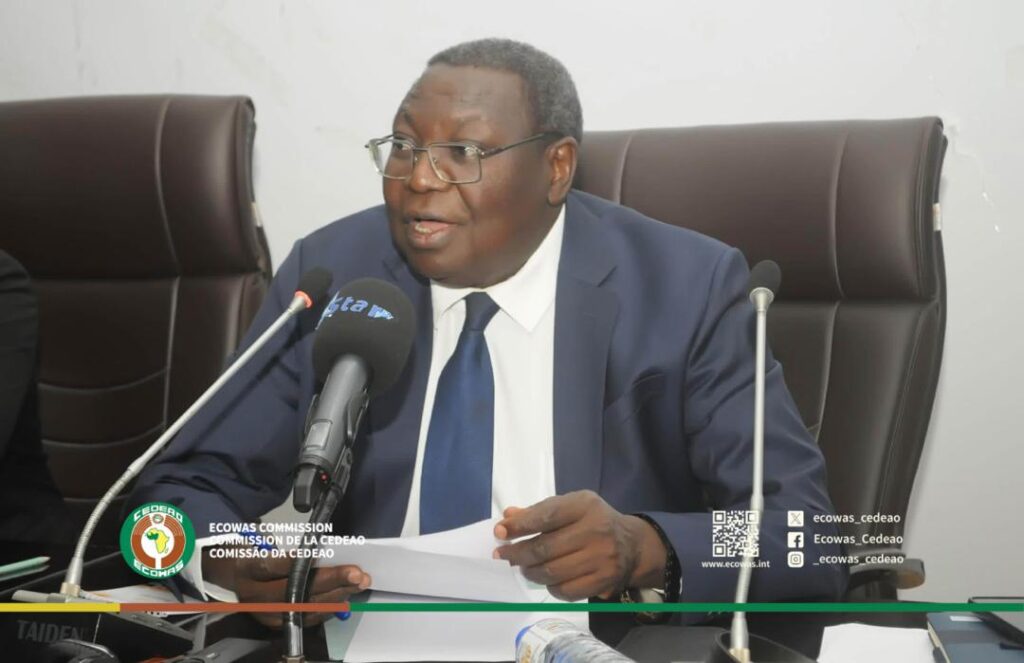ECOWAS Advances Digital Transformation with E-Government Experts Forum
By Raymond Enoch
The ECOWAS Commission In a bold step towards fostering digital integration and governance, held a high-level Experts Forum on e-Government on February 6-7, 2025 in The Gambia.

The event, organized in collaboration with the United Nations Department for Economic and Social Affairs (UN DESA), brought together experts and policy makers to discuss strategies for enhancing digital governance across the region.
The forum is part of the West Africa Regional Digital Integration Project (WARDIP), a World Bank-funded initiative aimed at accelerating digital transformation in ECOWAS member states.

With the increasing reliance on digital services for governance, the discussions focused on cross-border data sharing, public and private sector collaboration, and the development of national e-government platforms.
In his key note address at the forum, Mr. Sédiko Douka, ECOWAS Commissioner for Infrastructure, Energy, and Digitalisation, emphasized the role of digital technologies in driving economic growth. He reiterated ECOWAS’s Vision 2050, which aims to position ICTs as an engine for regional economic development between 2024 and 2029.
“Digitalisation is no longer a choice but a necessity for inclusive and sustainable development in West Africa,” Mr. Douka stated.
He stressed the need for deepened collaboration between regional governments, international partners, and the private sector to overcome challenges such as limited infrastructure, digital literacy gaps, and fragmented data governance policies.
During the forum, experts from across ECOWAS examined trends in e-government development, interoperability frameworks, artificial intelligence, and digital identity systems. Insights from the United Nations 2024 e-Government Survey were presented to assess the progress of online public service delivery and digital governance in the region.
Speaking on behalf of Mr. Juwang Zhu, Director of UN DESA’s Public Institutions and Digital Government Division, Associate Expert Mr. Junho Lee highlighted the importance of strong digital institutions in achieving an efficient and inclusive digital government framework.
“E-government is not just about technology—it is about rethinking governance to ensure accountability, inclusivity, and efficiency in public service delivery,” he said.
Experts also discussed the role of artificial intelligence in governance, the integration of e-commerce, e-health, e-agriculture, and e-education into national digital strategies, and how ECOWAS countries can build a single digital market for shared prosperity.
One of the key outcomes of the forum was the formulation of recommendations to accelerate e-government development in West Africa. These include:
Strengthening cross-border data sharing to facilitate seamless digital services across ECOWAS nations.
Investing in digital skills development to bridge the literacy gap and ensure inclusive digital adoption.
Enhancing national e-government platforms to improve public service delivery and efficiency.
Developing regional interoperability frameworks to ensure data consistency and integration across member states.
Increasing public-private partnerships to drive digital infrastructure investment.
As ECOWAS continues its journey towards digital transformation, the unwavering commitment of governments, international bodies, and digital stakeholders will be crucial in achieving a fully integrated e-government ecosystem that promotes economic growth, transparency, and social inclusion in the region.
The forum marks a significant milestone in ECOWAS’s digital agenda, reinforcing the region’s commitment to leveraging technology for good governance. With the support of international partners like UN DESA and the World Bank, ECOWAS is taking proactive steps towards a future where digital governance becomes a cornerstone of sustainable development in West Africa.
It is noted that as the West African region moves forward, the success of e-government initiatives will depend on collective action, investment in technology, and the willingness of member states to embrace digital transformation as a tool for progress.








